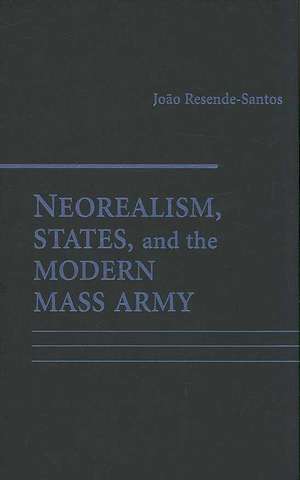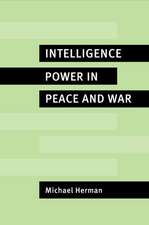Neorealism, States, and the Modern Mass Army
Autor Joao Resende-Santosen Limba Engleză Hardback – 29 iul 2007
| Toate formatele și edițiile | Preț | Express |
|---|---|---|
| Paperback (1) | 281.39 lei 6-8 săpt. | |
| Cambridge University Press – 22 iul 2007 | 281.39 lei 6-8 săpt. | |
| Hardback (1) | 623.19 lei 6-8 săpt. | |
| Cambridge University Press – 29 iul 2007 | 623.19 lei 6-8 săpt. |
Preț: 623.19 lei
Preț vechi: 700.20 lei
-11% Nou
Puncte Express: 935
Preț estimativ în valută:
119.25€ • 124.82$ • 99.25£
119.25€ • 124.82$ • 99.25£
Carte tipărită la comandă
Livrare economică 31 martie-14 aprilie
Preluare comenzi: 021 569.72.76
Specificații
ISBN-13: 9780521869485
ISBN-10: 052186948X
Pagini: 332
Ilustrații: 4 tables
Dimensiuni: 155 x 235 x 21 mm
Greutate: 0.56 kg
Ediția:1
Editura: Cambridge University Press
Colecția Cambridge University Press
Locul publicării:New York, United States
ISBN-10: 052186948X
Pagini: 332
Ilustrații: 4 tables
Dimensiuni: 155 x 235 x 21 mm
Greutate: 0.56 kg
Ediția:1
Editura: Cambridge University Press
Colecția Cambridge University Press
Locul publicării:New York, United States
Cuprins
1. Military emulation in the international system; 2. Theory of military emulation; 3. Arms and states in nineteenth century South America; 4. Military emulation in Chile, 1885–1914; 5. Military emulation in Argentina, 1895–1930; 6. Military emulation in Brazil, 1870–1930; 7. Conclusion.
Recenzii
"This is a fascinating, impressively documented, and intellectually provocative book which ‘marries Waltz and Tilly’ through the integration of comparative politics and international relations theory. This book will fascinate scholars interested in improving the predictive capacity of neorealist international relations theory; scholars and practitioners seeking to understand the state-building implications of responses to external imperatives; and scholars, practitioners, and citizens who want to understand why and how three South American countries - Argentina, Brazil, and Chile - built modern mass armies at the dawn of the twentieth century."
Louis W. Goodman, American University
"Joao Resende-Santos gives us a masterful example of theoretically informed qualitative scholarship in this new book. His findings about the efforts of Argentina, Brazil, and Chile to emulate European military developments are inherently interesting and theoretically important. This book will be of great value to students and scholars of comparative government and international relations."
Joseph M. Grieco, Duke University
"This is an important book that will be a 'must read' for scholars studying IR theory, state-building and the Latin American military. Resende-Santos’ theory of emulation extends Neo-Realism into new areas and rejuvenates the IR field. The case studies themselves present original and important empirical material that will benefit scholarship across a variety of disciplines."
David Mares, University of California, San Diego
Louis W. Goodman, American University
"Joao Resende-Santos gives us a masterful example of theoretically informed qualitative scholarship in this new book. His findings about the efforts of Argentina, Brazil, and Chile to emulate European military developments are inherently interesting and theoretically important. This book will be of great value to students and scholars of comparative government and international relations."
Joseph M. Grieco, Duke University
"This is an important book that will be a 'must read' for scholars studying IR theory, state-building and the Latin American military. Resende-Santos’ theory of emulation extends Neo-Realism into new areas and rejuvenates the IR field. The case studies themselves present original and important empirical material that will benefit scholarship across a variety of disciplines."
David Mares, University of California, San Diego
Notă biografică
Descriere
This book examines why countries copy the military systems of one another.















